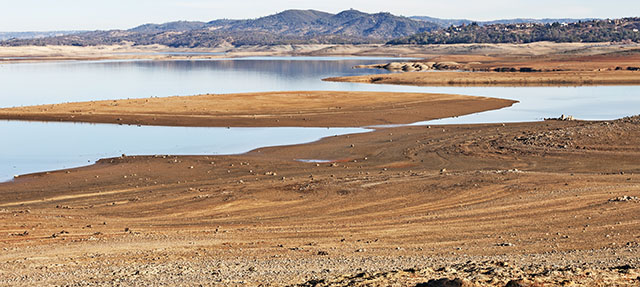
Aug 18, 2021Legislation provides more than $8B for water infrastructure in the West
With vast swaths of the West experiencing exceptional or extreme drought conditions and more than 90 active wildfires, a national coalition led by the California Farm Bureau has helped secure Senate approval for major federal investments in critical water projects.
California Farm Bureau President Jamie Johansson applauded the Senate’s passage of legislation to fund $550 million in infrastructure spending over the next five years.
As drought conditions continue to worsen throughout the West, he said, “now is the time to invest and make timely improvements in our nation’s water management portfolio.”
“The diverse investments in western water infrastructure and our national forestlands included in this package will assist farmers, ranchers, water providers and rural communities impacted by wildfires, water shortages and a changing hydrology,” Johansson said.
The legislation provides more than $8 billion for water infrastructure in the Western U.S. That includes money for repairing dams and canals, providing new surface and groundwater storage and conveyance facilities, and improving water conservation and recycling.
The bill, which must still be passed in the House, would also enhance watershed management and ecosystems. It would support rural water programs, desalination, dam safety and WaterSMART programs.
In addition, the bill would provide more than $3 billion nationally for wildfire prevention and suppression.
Backing the legislation were western farmers, ranchers, water providers, businesses and communities. They joined in the national coalition that rallied behind the bipartisan Infrastructure Investment and Jobs Act.
The coalition said the legislation aligned with solutions that water managers across the West have requested for years and provides a balanced package of tools that local and regional managers to best resolve local water needs and challenges. It argued that changing Western hydrological conditions and expanding populations required immediate federal investments in repairing aging water infrastructure and developing new sources of water supply.
The overall infrastructure package, which the Senate passed by a 69-30 vote, includes new spending on roads, bridges, transit, ports, broadband and water infrastructure. The legislation is the product of more than a month of negotiations.
“The investments in our nation’s roads, bridges, ports and inland waterways are not just necessary, they are long overdue,” said American Farm Bureau Federation President Zippy Duvall. “This legislation also provides critical investments that will expand broadband internet access and repair and upgrade aging western water infrastructure that is, in many cases, 50 to 100 years old and not adequate to meet today’s needs.”
Attention now turns to the House to mirror the water provisions in its infrastructure package.
Rep. Jim Costa, D-Fresno, chairman of the Livestock and Foreign Agriculture Subcommittee, emphasized the need for improvements to the state’s aging water infrastructure, adding, “Valley farmers feed the world and should be prioritized in the president’s infrastructure package. I will do everything I can to make that happen.”
If the infrastructure bill moves forward in the House, it eventually will be paired with a $3.5 trillion budget reconciliation package that includes Democrat priorities such as climate, health and social priorities. The budget framework instructs committees to draft their pieces of the reconciliation proposal by Sept. 15.
House Speaker Nancy Pelosi, D-San Francisco, has said she won’t bring it to a floor vote until the Senate passes the reconciliation bill. A reconciliation package would be able to pass the Senate with a simple-majority vote, so Democrats could move it without Republican support.
The Congressional Budget Office estimates that the legislation would increase the federal deficit by $256 billion over ten years. But proponents say that the spending will be offset through new revenue and other savings.
“The concern about reconciliation is how the proposed $3.5 trillion package will be paid for,” said Erin Huston, California Farm Bureau federal policy consultant. “Different tax policy proposals have been in the mix, so we’re very worried about new policies being implemented that either take current provisions away, set new lower thresholds or eliminate them completely.”
AFBF argues that legislation resulting from the reconciliation language in the budget resolution will need to be offset by some combination of reductions in other federal spending, additional deficit spending and tax increases.
The national federation has expressed concerns over potential tax burdens under a proposal to eliminate a provision designed to protect agricultural estates. The provision – known as “stepped-up basis” – resets the value of farmland, buildings and livestock after the owner’s death. It is designed to protect surviving family members and business partners from excessive taxation to ensure the financial stability of the operation.
Tax increases being discussed to pay for the spending bill include an increased corporate tax rate, imposition of capital gains at death, subjecting capital gains to normal income tax rates for high earners, revising small business deductions and putting a cap on capital gains deferrals.
The House is expected to return the week of Aug. 23 to consider the budget after its expected passage in the Senate.
– Christine Souza, California Farm Bureau Federation







